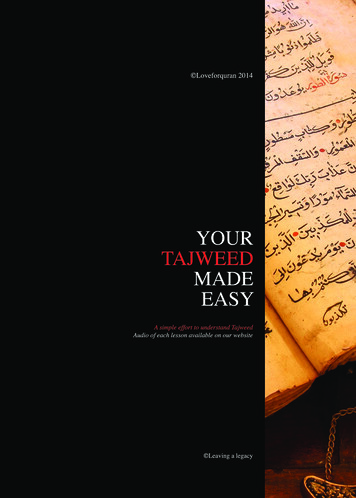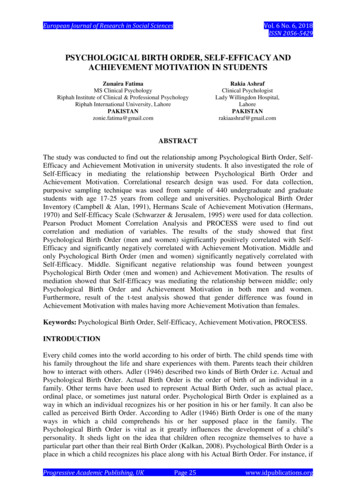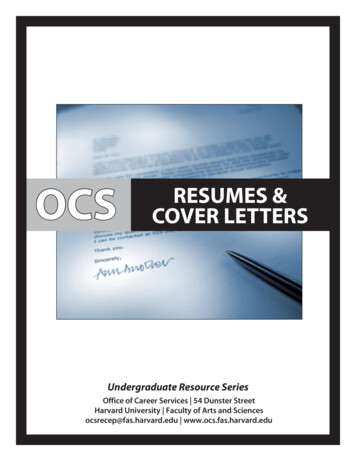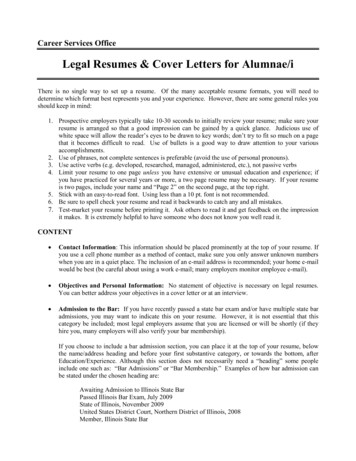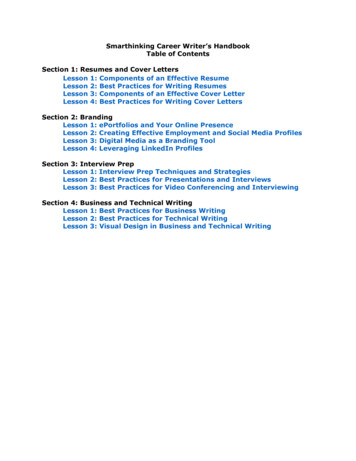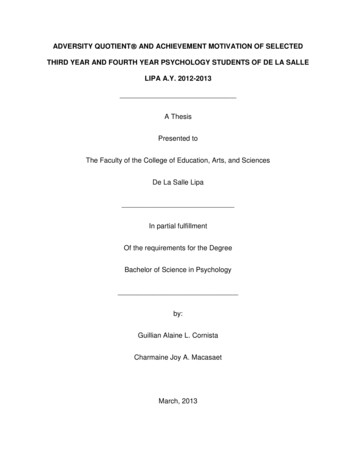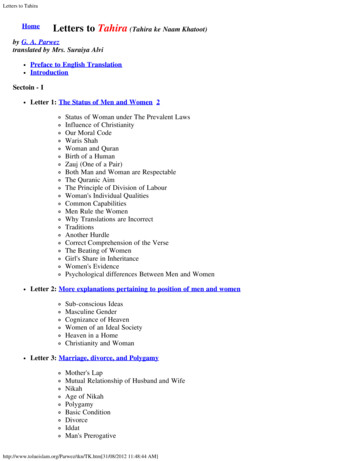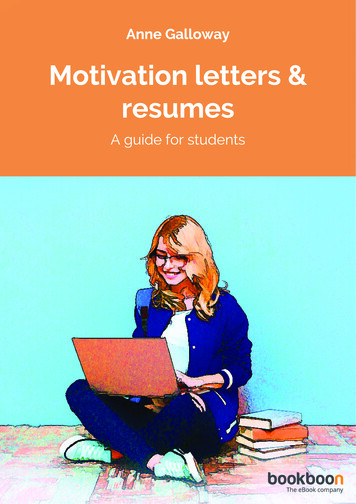
Transcription
ANNE GALLOWAYMOTIVATION LETTERS& RESUMESA GUIDE FOR STUDENTS2
Motivation letters & resumes: A guide for students1st edition 2018 Anne Galloway & bookboon.comISBN 978-87-403-2212-53
MOTIVATION LETTERS & RESUMES:A GUIDE FOR STUDENTSCONTENTSCONTENTSAbout the Author6Preface7What is a personal statement and why do you need it?9Part 1 - Know your skills, strengths and achievements112Know your skills123Your achievements18Part 2 - Personal statement (motivation) for university applications204Why do you want to go to university?215Course information256The first draft287Your movie trailer301Free eBook onLearning & DevelopmentBy the Chief Learning Officer of McKinseyDownload Now4
MOTIVATION LETTERS & RESUMES:A GUIDE FOR STUDENTS8CONTENTSThe final step!32Part 3 - Motivation letter for job applications349How to get your CV read3510Writing a strong motivation letter38Part 4 - Your first CV42How to write your first Curriculum Vitae43Bonus material51List of power words52115
MOTIVATION LETTERS & RESUMES:A GUIDE FOR STUDENTSABOUT THE AUTHORABOUT THE AUTHORAnne Galloway is an international careers consultant and Certified Advanced Resume Writer.She is an Associate Member of the Association of Career Professionals International and amember of Career Directors International which ensures that she remains up-to-date withcurrent resume writing techniques and job search trends.Help clients return to work after a career break, make a complete career change or acceleratetheir current career, Anne works with people across many career stages (from students tosenior executives), industries and geographical locations.The methodology she uses is very practical and results focused to ensure that her clientshave a clearer picture of the direction they want to take their career and are both capableand confident in selling themselves for their next job.Anne knows the right questions to ask to get her clients to really dig deep and think abouttheir careers and what they have achieved so they can confidently move forward.“I consider myself extremely lucky to have a job I love doing andthat enables me to help others get a job they love too.”6
MOTIVATION LETTERS & RESUMES:A GUIDE FOR STUDENTSPREFACEPREFACEAs a Certified Advanced Resume Writer and Careers Consultant, I help people to identifytheir skills, strengths, and achievements and show them how to use this information to sellthemselves confidently on their CV, Motivation Letters and Social Media, increasing theirchance of getting the job they want.I am currently working with 50 clients, from 30 nationalities across 10 countries (youcan find out more about how I can help you on your path to career success by visiting mywebsite, www.power-to-change.eu ).In addition, I have worked with numerous students with their applications to universities inthe UK, Netherlands, and the USA. Many teenagers become overwhelmed by the thoughtof writing a personal statement as part of their university application. Likewise, manypeople struggle with what to include in job applications. By knowing the questions to askto bring out the information required to write a personal statement or motivation letter Ihave simplified the process and reduced the stress for numerous clients.Everyone is unique so your personal statement, or motivation letter, should also be unique.The words personal statement, motivation letter, and job application cover letter, areinterchangeable and effectively mean the same thing; that is, in brief, they are all aboutexplaining why you are the right person for the university place or for the job to whichyou are applying. For ease of reference, the term ‘motivation letter’ will be used throughoutthis workbook.What you will not find in this workbook are any examples of motivation letters and I wouldlike to ask you never to go online to see examples of personal statements or motivationletters because even with the best will in the world, you will end up copying parts of thetext into your own or you will end up using a very bland and boring template which doesnot sell you. Companies and universities want to know more about you, what you arecapable of as well as something about your personality - you are unique so make sure thatyou reflect this in your motivation letter. In addition, universities use plagiarism checkersand they kick out students for plagiarism so there is no way your application will even getlooked at if it doesn’t pass the plagiarism checker.There are however some examples of CVs (the words CV and resume are interchangeablethroughout) but these have been included more to give you an idea of layout and how towrite them.7
MOTIVATION LETTERS & RESUMES:A GUIDE FOR STUDENTSPREFACEThis workbook is designed to show you that writing your unique motivation letter and CV isnot that difficult if you follow the simple steps that are clearly outlined in the following pages.Let’s get started!All photos courtesy of Microsoft clip organiser8
MOTIVATION LETTERS & RESUMES:A GUIDE FOR STUDENTS1WHAT IS A PERSONAL STATEMENTAND WHY DO YOU NEED IT?WHAT IS A PERSONALSTATEMENT AND WHYDO YOU NEED IT?Companies frequently receive hundreds of applications for each vacancy they advertise;likewise, universities receive many more applications than they have places for students,sometimes there can be ten or more students chasing every place on their chosen course.Employers and universities need to have a process to ensure that they accept the bestapplicants and a key part of that process is the motivation letter or personal statement.It is effectively a one-page advertisement of you, so it must be brief, enthusiastic andinteresting. One of the main functions of a motivation letter is to describe how yourqualifications match a specific job vacancy or how your interests match with your chosencourse of study, it is pointless to send a boilerplate motivation letter that is not tailored tothe targeted position or course.How do you show that you are good enough?The quick and dirty answer to this question is very simple, show, don’t tell. You want tobe able to describe your interests, skills, experiences, and motivation in a way that otherscan’t, then show that you are ambitious, confident, and goal oriented. You do this by usingwords and phrases that demonstrate creativity and an ability to think outside the box.In addition to “Show, don’t tell”, the way in which you write your motivation letter is asimportant as what you write.A quick example: For university applications anyone can write, “I am highly motivated to studypolitics.” In fact, so many students use something similar that it has become ameaningless cliché. If it is true for you, and you want to get this across, you needto think carefully about how you can express this statement so that instead of justsaying that you are motivated, you show that you are.9
MOTIVATION LETTERS & RESUMES:A GUIDE FOR STUDENTSWHAT IS A PERSONAL STATEMENTAND WHY DO YOU NEED IT? For job applications anyone can start by writing, “I am writing to apply for thesales intern position you have posted on your company website.” However, this isboring and will not make you stand out.So just how do you show that you are the right candidate?The answer is to follow the simple steps outlined in the following chapters and where betterto start than Part 1 – Know your skills, strengths and achievements.10
MOTIVATION LETTERS & RESUMES:A GUIDE FOR STUDENTSPART 1 - KNOW YOUR SKILLS, STRENGTHSAND ACHIEVEMENTSPART 1 - KNOW YOUR SKILLS,STRENGTHS AND ACHIEVEMENTS11
MOTIVATION LETTERS & RESUMES:A GUIDE FOR STUDENTS2KNOW YOUR SKILLSKNOW YOUR SKILLSBefore you can start to write your motivation letter, you need to know your skills and beable to communicate them confidently.You might be surprised to know that you already have many of the skills which are essentialfor employment. These are not the specific knowledge-based skills you would learn duringan apprenticeship, in university or at work, but the ‘transferable skills’ which we all needto use when we work with other people, on projects, or even by ourselves. These skills aredeveloped by being involved in everyday activities.The skills we are talking about don’t really stand out, which is why we usually don’t noticethem. These ‘ordinary’ skills are so often taken for granted that we seldom make any effortto improve or develop them. Some, for example ‘communication skills’, ‘people skills’ and‘organisational skills’, are the skills which most people develop without even noticing it.Which transferable, or ‘soft’ skills do you have?Let’s think about some of the different types of work or hobbies that you have alreadydone and recognize the skills that you have developed. The reason you are going to do thisis that sometimes we don’t realize that every job involves transferable skills which you canuse in other jobs. So, we are going to use the following diagram to identify the skills youalready have.12
MOTIVATION LETTERS & RESUMES:A GUIDE FOR STUDENTSKNOW YOUR SKILLSJobTask 1Skill 1Task 2Skill 2Skill 1Let’s run through an example.:Waiter/waitressThe first things that come to mind are that a waiter has to be: Honest – handling money;Reliable – must arrive on time and stay as long as required;Good customer handling skills – some customers are difficult to deal with;Good at maths – able to give correct change.Able to communicate with kitchen staff.By breaking down the key tasks of a waitress, you can more clearly identify the skills involved.WaitressTake ordersExplained menuoptions InterpersonalCommunicationSuggestedoptions to guest SalesPut food ordersinDeliver food totableTake paymentRelayed ordersto cooking staff TeamworkAccuratelydistributed food OrganizationManaged variousamounts ofmoney Cash Handeling13
MOTIVATION LETTERS & RESUMES:A GUIDE FOR STUDENTSKNOW YOUR SKILLSExercise 1Now it’s your turn. Think of a part-time job you have had or a sport/hobby you take partin and complete the following chart.Fast-trackyour careerMasters in ManagementStand out from the crowdDesigned for graduates with less than one year of full-time postgraduate workexperience, London Business School’s Masters in Management will expand yourthinking and provide you with the foundations for a successful career in business.The programme is developed in consultation with recruiters to provide you withthe key skills that top employers demand. Through 11 months of full-time study,you will gain the business knowledge and capabilities to increase your careerchoices and stand out from the crowd.London Business SchoolRegent’s ParkLondon NW1 4SAUnited KingdomTel 44 (0)20 7000 7573Email mim@london.eduApplications are now open for entry in September 2011.For more information visit www.london.edu/mim/email mim@london.edu or call 44 (0)20 7000 7573www.london.edu/mim/14
MOTIVATION LETTERS & RESUMES:A GUIDE FOR STUDENTSKNOW YOUR SKILLSThink about other things that you have done too. For example, have you: helped out backstage for a school performance? – Teamworkhelped sort out a disagreement between others in your class? – Communicationorganised a party or event? – organisational skillscaptained your football team? – Leadership, teamworkComplete the following chart for another (part-time) job, sport, or hobby.Make a list of your transferable skills below: Does your list include any of the following top 10 transferable and essential skills?1. Communication Skills6. Learning Skills2. Teamwork Skills7. Computer Skills3. Time Management Skills8. Listening Skills4. Problem-Solving Skills9. Creativity Skills5. Organization Skills10. Leadership Skills.15
MOTIVATION LETTERS & RESUMES:A GUIDE FOR STUDENTSKNOW YOUR SKILLSTechnical skillsWhen you apply for a job you will probably be evaluated on the basis of your technical orhard skills – these are the skills that can be learned through formal education, on the jobtraining or volunteer experience. Examples of technical skills include: computer programming,accounting, designing, operating machinery, scientific knowledge, car repair, etc. Technicalskills often constitute the bare minimum that an employer looks for in a candidate.Make a list below of all the technical skills you believe you have. Personal skills and qualitiesWe all have our own set of personal skills and qualities, for example, the ability to get alongwith people, persistence, adaptable, enthusiastic, reliable, accurate. Employers will alwayslook for these skills to some extent and they can be the one thing that separates you fromanother candidate.Make a list below of what you believe are your personal skills and qualities. 16
MOTIVATION LETTERS & RESUMES:A GUIDE FOR STUDENTSKNOW YOUR SKILLSTake time now to go through your all your skills with a friend or relative to make and addany that they think you have missed.Now that you have a complete list of your skills, take a close look at them. Can you trulysay that you have all of these?The thing is, it is not enough to just say what your skills are, you have to be able todemonstrate that you really do have the skills you say you have. To do this, you need tobe able to show what you have achieved by using these skills. The following chapter willshow you how.17
MOTIVATION LETTERS & RESUMES:A GUIDE FOR STUDENTS3YOUR ACHIEVEMENTSYOUR ACHIEVEMENTSWho do you know that has achieved something really great?What do you admire about this achievement?Why do you think it is important to recognise your achievements?Being able to identify and communicate achievements is an important part of deciding whatto put in a motivation letter, it is also really important when it comes to job interviews.When you value and appreciate yourself, this helps others to value and appreciate you.Exercise 2:Think about a time when you did something and felt a real sense of achievement (alternatively,think about a time when you used one of your skills you identified in the previous chapter)and answer the following questions:To help you out, we will start with an example in italics.1. What was the task or challenge?Captain my football team and take them from bottom of the league to being in the top 3.2. What did I have to do to achieve this?Plan game strategies and ways to motivate the team3. What obstacles did I have to overcome?Some team members had lost motivation and weren’t making any effort.4. What skills did I use?Leadership, planning, communication, teamwork, organisation.5. How did I work with others?Asked for their input into game strategies, got agreement for extra training sessions.6. What did I do best?Finding ways to get the team to listen to my ideas.18
MOTIVATION LETTERS & RESUMES:A GUIDE FOR STUDENTSYOUR ACHIEVEMENTS7. What did I learn from this?It is important to be able to adapt the way I communicate to ensure that I was understoodby the whole team as not everyone has the same communication style.Now it’s your turn to answer the questions below.1. What was the task or challenge?2. What did I have to do to achieve this?3. What obstacles did I have to overcome?4. What skills did I use?5. How did I work with others?6. What did I do best?7. What did I learn from this?Later you can develop these achievements into short statements, each with the same structure:- Begin with a short explanation of the problem,- Give a brief overview of what you did,- Indicate the positive outcome.This is how you show rather than just say what your skills are.The final part of the information gathering phase is to relate the information you havegathered about yourself to either: the exact course and university you want to apply to – see Part 2 the job vacancy and company you want to apply for – see Part 319
MOTIVATION LETTERS & RESUMES:A GUIDE FOR STUDENTSPART 2 - PERSONAL STATEMENT (MOTIVATION)FOR UNIVERSITY APPLICATIONSPART 2 - PERSONALSTATEMENT (MOTIVATION) FORUNIVERSITY APPLICATIONS20
MOTIVATION LETTERS & RESUMES:A GUIDE FOR STUDENTS4WHY DO YOU WANT TO GO TO UNIVERSITY?WHY DO YOU WANT TOGO TO UNIVERSITY?When you apply to study at university, you usually have to send in a number of importantdocuments including your C.V, predicted marks, language certificate etc., but one of thekey documents required - the one that can really make the difference and assure you a placeon your desired course - is the personal statement; your motivation for studying.Universities frequently have more than one applicant for each position on the course and Ihave seen courses that have up to 20 students applying for each position. All these studentshave the required entry qualifications so how can a university decide on who should getthe place? Whether or not your application is accepted will depend largely your personalstatement.This puts a lot of stress on many students - how to convince universities that you are theright student to be chosen for the course.Unlock your potentialeLibrary solutions from bookboon is the keyeLibraryInterested in how we can help you?email ban@bookboon.com21
MOTIVATION LETTERS & RESUMES:A GUIDE FOR STUDENTSWHY DO YOU WANT TO GO TO UNIVERSITY?You may have top marks in your school exams, however having good marks does not alwaysguarantee you a university place. You must find an effective way to present yourself andyour qualifications. The best way to do this is to interweave your skills, achievements, andpersonality traits in a brief presentation that shows the university that you have what theyare looking for and are good enough to be offered a position.The ‘why’Having a clear idea of why you are motivated to study a particular subject has to comeacross on your personal statement.Exercise 3 - What motivates you?Motivation is what causes us to act, whether it is getting a glass of water to reduce thirstor reading a book to gain knowledge.What motivates you to study this particular subject? What are the reasons for wanting tofollow the course you’ve chosen?The key here is to keep asking yourself ‘why?’ until you get to the real answer behind whereyour interest comes from.Let me give you an example:What do I want to study?“I want to study politics”Why?“I’ve just always been interested in politics so thought I would like to study it at university.”This is a bit boring so it’s time to dig deeper so that you can come up with a more uniqueanswer that shows that you are driven, enthusiastic and keen to discover more.Where did your interest in politics come from?“I’ve always read lots of books and watched political programmes on TV”22
MOTIVATION LETTERS & RESUMES:A GUIDE FOR STUDENTSWHY DO YOU WANT TO GO TO UNIVERSITY?Which books and programmes in particular? .Why those ones? .What particularly grabbed your attention in them? .Who have you had interesting political discussions with? .Why do these discussions stand out in your memory? .Now it’s your turn, to write down your answers.What do I want to study?Why?What really makes you interested in this subject?Why?Who has influenced you in this subject?Why?What do you see yourself doing with this subject once you graduate?Why?23
MOTIVATION LETTERS & RESUMES:A GUIDE FOR STUDENTSWHY DO YOU WANT TO GO TO UNIVERSITY?The more you can delve into your own positive experiences of enjoying a subject, the moreyour unique personality will show through.Now that you have brainstormed why you want to study your chosen subject, the next stepis to carry out some research into your chosen course.360 thinking.Discover the truth at www.deloitte.ca/careers24 Deloitte & Touche LLP and affiliated entities.
MOTIVATION LETTERS & RESUMES:A GUIDE FOR STUDENTS5COURSE INFORMATIONCOURSE INFORMATIONBefore you can begin to write your personal statement, you need to find out as much aspossible about the university that is offering your chosen course and about the course itself.Usually the university’s website is clear and informative about their requirements, expectationsand about what qualifications and qualities they hope their candidates have. Knowing alittle bit about their requirements, about their main projects, activities, course structure etc.will help you get an idea of what to include in your personal statement.This area of information gathering is one that you really need to spend time on. Go throughthe university website and the pages relevant to the course you want to study in detail andtake notes.Answering each of the following questions will help you get more of the key informationneeded for your personal statement.About the course: What does the website say is the aim of the course? How is the course presented? Is it all lectures or are there workshops, practicalsituations/case studies? How does the teaching method appeal to you? Is industry involved either in the development of the course or as guest speakers?Is this important to you? Why? How will you be assessed? Is it all written theory exams or is there a practical aspector does project work count toward your marks? Are you better at exams or do youprefer the practical element? Are your core competencies assessed each year? What subjects are included each year? Which are of most interest to you and why?25
MOTIVATION LETTERS & RESUMES:A GUIDE FOR STUDENTSCOURSE INFORMATION How much flexibility is there for you to choose your major and minor subjects?Which do you see yourself choosing and why? Does the course offer the chance to do an exchange or internship? Is this somethingthat interests you? Why? Is there an opportunity to collaborate with students on other courses? Is thissomething that interests you? Why? What core skills will you be able to develop on this course? Why do you thinkthey are important and how will you use them in the future? Is there a list of possible jobs you can do when you graduate? Which direction doyou see yourself going in and why?Now that you have a more in-depth knowledge about the course and subjects involved, itis time to turn your attention to the university itself and what it offers.About the university: What is the university’s vision and values? Do they resonate with you? Does the university have an international network and/or strategic partnerships andif so is that important to you? Why? Does it have a global alumni network?26
MOTIVATION LETTERS & RESUMES:A GUIDE FOR STUDENTSCOURSE INFORMATION Does it have a student’s union? If so, are there any extracurricular activities e.g.student societies, sports or volunteering opportunities that interest you? Why? How can you make a positive contribution at this university? How do you know you will fit in at this university?Now that you know a lot more about both yourself and the course you are applying for,you are ready to start pulling all this information you have gathered into creating the firstdraft of your personal statement.Get a higher markon your courseassignment!Get feedback & advice from experts in your subjectarea. Find out how to improve the quality of your work!Get StartedGo to www.helpmyassignment.co.uk for more info27
MOTIVATION LETTERS & RESUMES:A GUIDE FOR STUDENTS6THE FIRST DRAFTTHE FIRST DRAFTNow that you have gathered all the information you need, just how much of it should youinclude in your personal statement? In order to create your first draft, you need to knowthe questions that have to be answered to ensure your personal statement gets you a placeon the course.You are probably thinking, “have I not answered enough questions?!” Well yes, however theprevious questions were all about gathering the necessary information together to be ableto answer the key questions listed below!When you first start writing your personal statement, allow yourself to go crazy. Use theinformation you have pulled together about yourself in the previous chapters and writeabsolutely everything that comes to your mind when answering the questions below. Atthis stage you aren’t trying to write a formal essay.Key questions to answer:1. Why do you want to study the course you have chosen?What motivates you to take this course at a university-level?How has your interest enthusiasm for it developed?This is where you need to tell a bit about your background. You may think thatthis is a waste of time because the other documents you have to submit with yourapplication already contain this information, i.e. where you studied, your predictedgrades, the classes you took however, now is your chance to make all this sound farmore interesting by creatively describing your experiences.2. What makes you the right person for the course?This is where you get to show that not only do you meet the selection criteria butthat you have also done your research and are prepared for what is involved instudying your chosen course. Mention how you want to further develop the skillsyou have learnt from both school and your extracurricular activities that are relevantto your chosen course.28
MOTIVATION LETTERS & RESUMES:A GUIDE FOR STUDENTSTHE FIRST DRAFTDon’t make the mistake of mentioning all your skills though; instead, focus on thosethat are a requirement for, or most relevant to, the course.Remember to demonstrate these skills rather than just say you have them - you spenta lot of time identifying your transferable skills so be sure to include them!3. What else have you done that is relevant to the course?Have you done any extra reading, voluntary work or work placement, competition,etc. related to the subject? If so, what did you find particularly interesting.4. How is this course relevant to your chosen career?Clearly describe your chosen career path and how what you have learnt both in andout of school relate to it. Why is this particular course the right one for you to be ableto follow your chosen career? Make it interesting and personal so that you stand out.While you may know the subject you want to study, you may not yet have decidedexactly what path you want to take your career. If this is the case for you, don’t worryabout it, instead just talk about what you’re looking forward to learning about thesubject and what you want to gain from it.5. Why are you a good match for this course?This is also where you can bring in a few additional points about what you hope togain from studying at university and the contribution you hope to make. You canmention extracurricular opportunities and how you believe you will fit in.Now take a break before re-reading your answers and trying to formalise your notes. Thisis when you start deciding what is going to go into your personal statement and what younow feel is perhaps less relevant.Think about the words you want to use; can you make any of the verbs and adjectivesstronger to more uniquely describe what you want to say? If you are struggling, take a lookat the list of power words at the end of this workbook for ideas.This is effectively the first draft of your personal statement – congratulations!However, it is probably far too long!29
MOTIVATION LETTERS & RESUMES:A GUIDE FOR STUDENTS7YOUR MOVIE TRAILERYOUR MOVIE TRAILERIt’s time to think of your life as a film. You are the director and producer of your ownpersonal film which shows everything you have ever done in your life, every moment thatyou have achieved something and every time that you have used a particular skill.You now want to advertise your movie and to do this, like all good movies, you have toproduce a trailer which shows all the best bits condensed into about 30 seconds – that’sthe body of your personal statement, a trailer showing an all action version of your life’smovie. Effectively, your answers to the questions in the previous chapter are your movieso now you just need to condense your them into a trailer that highlights all the best bits!The key is to use brief paragraphs to write:1. IntroductionStart by stating why you are applying for the course and how it fits with your careerplans, i.e. the key points from your answers to questions 1 and 4 in chapter 6.2. The bodyWrite about how you have the necessary skills and what you hope to learn from thecourse, i.e. the key points from your answers to questions 2 and 3 in chapter 6.3. EndSummarise why it is the right course for you and what you are looking forwardto – here you can add some information about the extracurricular activities you arelooking forward to taking part in - this is where you can include the key points fromquestion 5 from chapter 6.Use the space on the next page to write your movie trailer.30
MOTIVATION LETTERS & RESUMES:A GUIDE FOR STUDENTSYOUR MOVIE TRAILER31
MOTIVATION LETTERS & RESUMES:A GUIDE FOR STUDENTS8THE FINAL STEP!THE FINAL STEP!Once you have completed your movie trailer, walk away from it for a day or two thengo back and re-read it to see if you can improve it further. Make sure the information isorganized in a clear and easy-to-understand way. Also, check for grammar errors, and makesure your tone is appropriate. Get someone else to read it as they may pick up things thatyou have missed, don’t rely on spell check – read it backwords! The letter should soundboth enthusiastic and professional and not contain any spelling or grammar mistakes!At this point, there are 2 things I want you to make sure that you avoid:ClichésThis is one of the most common mistakes people make when writing a motivation letterfor job applications, and the same goes for students when writing their personal statementsfor university applications.32
MOTIVATION LETTERS & RESUMES:A GUIDE FOR STUDENTSTHE FINAL STEP!Typical clichés include the following:“I am highly motivated to study maths at university.”“My greatest ambition is to become a top accountant.”“Since I was a child I have always been interested in science and especially chemistry.”These and other similar clichés frequently appear in university personal statements.While these sentences appear meaningless, they can actually prevent you from getting auniversity place because the reader may think that you either can’t come up with anythingc
applicants and a key part of that process is the motivation letter or personal statement. It is efectively a one-page advertisement of you, so it must be brief, enthusiastic and interesting. One of the main functions of a motivation letter is to describe how your qualiications match a speciic
